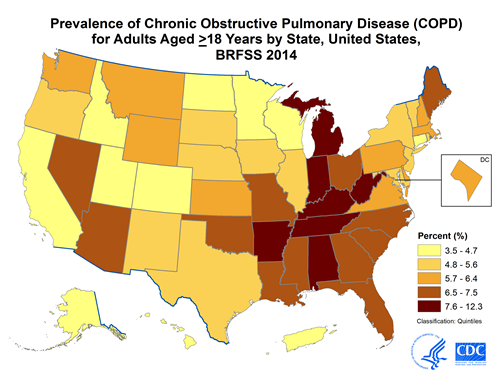
COPD Analysis Using CRISPR Technology
October 2016
Researchers from Johns Hopkins University have discovered two novel frameshift mutations that predispose patients to pulmonary fibrosis (PF)-emphysema. They found that these single nucleotide polymorphisms (SNPs) are associated with decreased levels of NAF1 and shortened telomeres, the latter of which had previously been linked to patients with familial PF-emphysema.

Using the TriLink Cas9 mRNA and custom long synthetic RNA, the authors showed that the disease-associated NAF1 mutations are functionally deleterious by disturbing entry of NAF1 into the nucleus and ultimately reducing telomerase stability.
Pulmonary fibrosis and emphysema are both part of a condition called chronic obstructive pulmonary disease (COPD). COPD is often associated with long-term exposure to substances that irritate the lungs (which can be exacerbated by certain gene mutations) and considered a primary culprit of lung disease, which is the third leading cause of death in the United States.
In approximately 15-20% of familial PF-emphysema cases, mutations have been linked to telomerase reverse transcriptase (TERT), and a total of ~10% of cases have been linked to other telomere genes, including the telomerase RNA, DKC1, TINF2, RTEL1 and PARN. However, mutations in the other 70% of familial cases have not been identified.
"The diagnosis of short telomere syndrome in these patients is relevant for patient care because the defect is systemic, and they show exquisite sensitivity to otherwise tolerated medications and procedures, especially in the setting of lung transplantation," the authors noted.
As reported in Science Translational Medicine, the authors first used whole-genome sequencing to identify two frameshift mutations near the NAF1 locus in patients with PF-emphysema. Both mutations were linked to lower levels of telomerase RNA and shortened telomeres.
Subsequently, they utilized CRISPR technology to demonstrate that reduced NAF1 expression in NAF +/- mice led to decreased levels of telomerase RNA and caused telomere shortening, however the function of other RNAs were spared.

"Our findings here, in the context of the published literature, highlight how telomere shortening is a relevant mechanism for PF-emphysema susceptibility in a subset of patients beyond those with mutations in the telomerase core components,” the authors stated. “It is thus possible that efforts to reverse the telomere defect, or other regenerative approaches, will influence the natural history of these progressive pathologies in patients with telomere-mediated lung disease."
Featured Product: Cas9 mRNA. TriLink offers several variations of Cas9 mRNA. Please see our full list here. If you do not see the mRNA variant that you need, please contact us to discuss our custom mRNA synthesis service. TriLink also custom synthesizes long RNA oligonucleotides to further enable your research. Simply enter your construct here.

